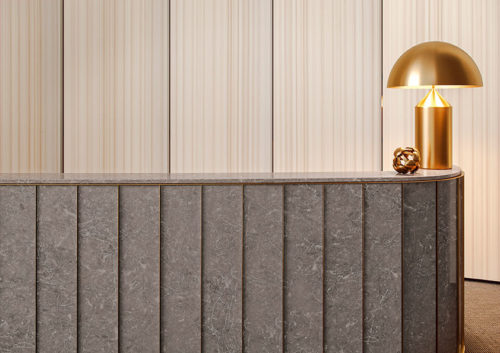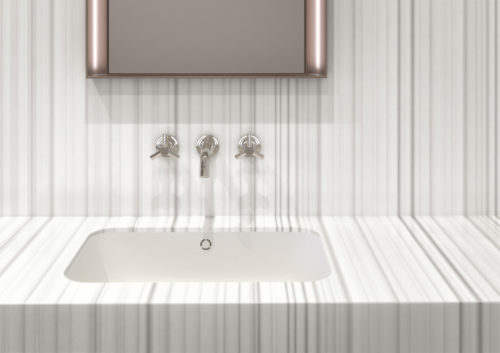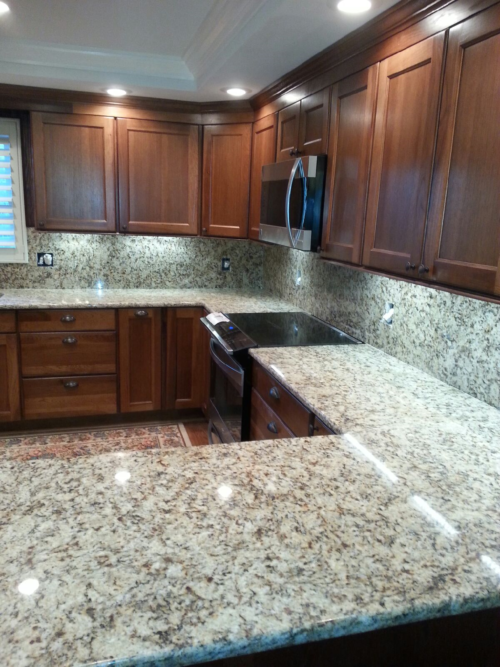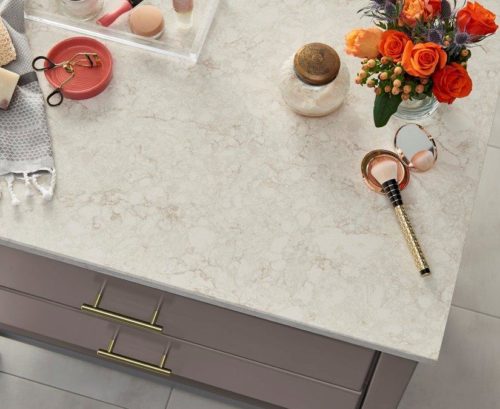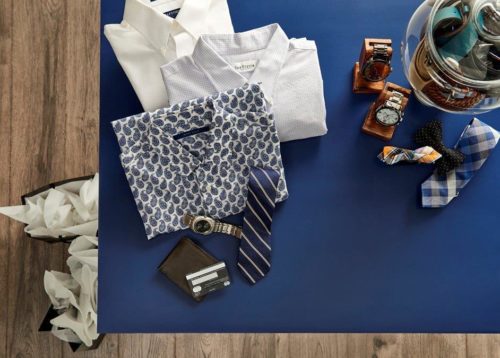Your countertop material has been narrowed down to two premium choices: Corian® and granite. These countertop materials are vastly different, and there are plenty of factors to consider before making a final selection.
For starters, Corian® is the brand name for DuPont’s surfacing material, and granite is a natural stone. The rainbow of colors of Corian® countertops might also appeal more than the earthy-tones of granite. Other differentiating factors between the two include durability, aesthetic appeal, and functionality.
What exactly are the differences between Corian® vs. granite? How do you make the best selection possible? Continue reading on to learn all about the best kitchen countertop material.
Composition
One of the biggest differences between Corian® and granite comes down to the composition and property characteristics of each material.
What is Corian® Made of?
We mentioned above that Corian® is the surfacing material of DuPont. In that sector, there are two surfacing materials one can choose from: Corian® Quartz and Corian® Solid Surface.
Corian® Quartz (formerly known as Zodiaq®) is engineered with pure quartz crystals. Quartz, which is found in the earth, is naturally hard which allows this surface to keep up with daily wear and tear while still maintaining its good looks. In fact, Corian® Quartz was one of the first quartz surfaces in the marketplace back in 2000.
Corian® Solid Surface (formerly known as Corian®) is a man-made material comprised of binding resins, various minerals, dyes, and other fillers that help to give it both color and texture. Similar to Corian® Quartz, Corian® Solid Surface was the only solid countertop surface on the market before Formica, Staron, and Wilsonart.
What Makes Up Granite Countertops?
Being an igneous rock that’s formed deep within the earth, granite is made up of felspar, quartz, and other naturally-occurring minerals. To mine granite, companies must retrieve it in large blocks. From there, the granite is cut into slabs, shaped, and polished. In this process, no materials are added or removed which makes granite as pure a stone as it can come.
Heat-Resistance
Now let’s get down to the nitty gritty details. Since you’re looking at Corian® vs. granite for a kitchen countertop, there are certain characteristics that are needed for it to be functional. The first of that being resistance to heat.
Can You Put Heat on Corian® Quartz or Corian® Solid Surface?
We recommend that you don’t. While these two surfacing materials can withstand a couple hundred degrees, a pot or pan that’s any hotter will cause damage.
To keep your surface in pristine condition, we advise that you always use a trivet with rubber feet to keep the heat directly off the surface.
Should You Use a Hot Pad with Granite?
While granite can withstand a hot dish taken directly from the oven, there have been cases of ‘thermal shock’ which can cause granite countertops to crack. Unfortunately, when it cracks the only way to fix it is to replace the entire slab which can be very expensive. It’s also very hard to find a slab that looks like the original, so oftentimes the whole countertop needs to be replaced instead of just a piece.
How Scratch Resistant is Corian® vs. Granite?
Another important question we get asked a lot.
Since Corian® Quartz is made from extremely hard quartz crystals, this surface can easily survive nicks and cuts that often occur from daily wear and tear. This definitely helps to minimize both short and long-term maintenance.
Corian® Solid Surface is more prone to scratches and minor nicks; however, for the most part, is can withstand normal wear and tear. Luckily with this surface, minor scratches can be removed with either a scouring pad or buffed out using a small machine.
Granite countertops are scratch-resistant. In fact, it is possible to cut on the surface with a knife, but we do recommend to be cautious. One quick, deep cut could end up harming your granite.
The perfect solution for all surfacing material is to use a cutting board.
Stain-Resistant: Which Surfacing Material Stains More?
One of the best benefits of Corian® Quartz is its nonporous characteristic. Due to this, quartz resists stains quite easily. Furthermore, when properly cleaned, it won’t grow mold, mildew, or bacteria.
Corian® Solid Surface is nonporous, stain resistant, and hygienic. All the colors of Corian® countertops have a silky smooth surface that doesn’t allow any liquids to penetrate. Additionally this surface can easily be wiped clean and doesn’t allow bacteria or mold to grow as there is no place for it to take hold.
Now let’s focus on granite. When not properly cared for, granite can stain. In fact, as soon as you spill something, it’s recommended to wipe it up as soon as possible (within a few minutes) or else you’ll be left scrubbing away for a long time or a stain.
Cleaning 101: The Difference Between Corian® vs. Granite
Cleaning and maintenance is one of the biggest differences you’ll see in Corian® vs. granite. Corian® Quartz is carefree by nature which means you can clean it with just soap and water.
Corian® Solid Surface is just as easy to clean. The only requirement is soapy water. You can also use a household cleaner with either ammonia, bleach, or alcohol and Scotchbrite® pad to disinfect it. Of course, there are some colors of Corian® countertops that can “hide” spills due to the color or pattern. A quick daily wipe can give you peace of mind that your countertops are 100% clean.
Granite is a bit more complicated and requires more maintenance. To clean granite, use warm soapy water daily. Weekly, you should also disinfect the surface with a ratio of 50% water and 50% isopropyl alcohol. Let this solution sit for approximately 3 minutes then wipe it up with a microfiber cloth. It’s never a good idea to use a cleaner with bleach, vinegar, or ammonia as overtime that will cause granite to look dull.
Which Material do You Need to Seal?
Since granite countertops stain easily, it’s very important to keep it sealed. In fact, sealing granite every 6 to 12 months is a step that should never be missed.
With Corian® Quartz and Corian® Solid Surface, a sealant, polish, or wax is never required to maintain it’s natural luster no matter what Corian® countertop color you choose.
Which Countertop Material Goes Best with Wood Cabinets?
Honestly, choosing a countertop material is entirely up to the look and feel desired. When it comes to Corian® vs. granite, the aesthetic appeal is very different.
Corian® Quartz has a natural stone and raw, earthly look to it. Unlike Corian® Solid Surface, quartz has a polished, shiny finish.
Corian® Solid Surface provides a seamless, uniform, and homogeneous look making it an ideal (and popular) choice for both residential and commercial kitchens. Additionally, Corian® Solid Surface has a matte look.
Granite, similar to Corian® Quartz, has a natural, earthly look. The variety of mineral speckles can make granite more distinctive than quartz.
While any of the above countertop materials can look fantastic in a kitchen, Corian® Solid Surface can be seamlessly integrated with wood, glass, and stone.
The Colors of Corian® Countertops vs. Granite
The variety of Corian® Quartz countertop colors range from light to dark granular and light to dark veined. From a pure white to a speckled red to a dark blue swirl, a natural and unique look can be achieved with Corian® Quartz.
The colors of Corian® Solid Surface countertops are available in a wide variety of textures and patterns. In fact, you can find all the colors of the rainbow: off white, beige, brown, gray/black, blue, green, yellow/red. Corian® Solid Surface can even be made to replicate a marble pattern.
Granite countertops come in a range of shades from creams, grays, greens, browns, and reds. All of these shades (for the most part) are available in light and dark. Since granite is a natural stone, every slab will have unique coloring and different speckles. Granite is also a bit more limited than Corian® Solid Surface countertop colors.
Final Thoughts: What Are the Advantages of Corian® vs. Granite?
To recap, Corian® Quartz has the following benefits:
- Extremely durable as it’s made from hard quartz crystals
- Comes with a 10-year transferable residential limited warranty. It never has to be sealed, polished, or reconditioned and is very easy to clean
- Nonporous and hygienic surface doesn’t allow liquids to penetrate
- Heat-resistant (the use of hot pads is recommended)
- Stain resistant and resists bacteria and mold growth
Corian® Solid Surface:
- Survives daily wear and tear
- Versatile surfacing material where liquids can’t penetrate
- Nonporous material that prevents dirt and stains
- Hygienic and doesn’t support the growth of mold or bacteria
- Any major scratches can be easily removed or buffed out restoring it to mint condition
- Seamless, smooth surface that allows the integration of countertops, backsplashes, sinks. It can also be used in showers and on vertical wall space.
- The colors of Corian® countertops come in a rainbow of options
Granite:
- Elegant and timeless aesthetic appeal
- Natural stone
- Durable and scratch-resistant
- Heat-resistant up to high temperatures. Just like with Corian® Quartz, we do recommend the use of a hot pad or trivet
As you can see there are a variety of differences and advantages between Corian® vs. granite. If you have any questions about the two surfacing materials or would like to request a sample of the colors of Corian® countertops, please contact our team today.

